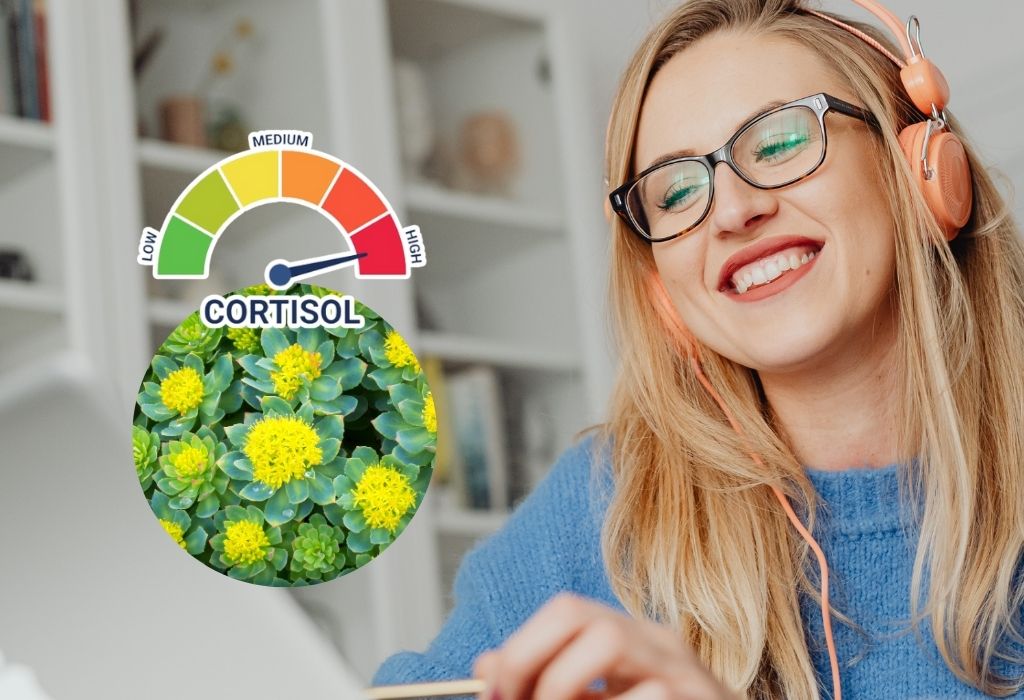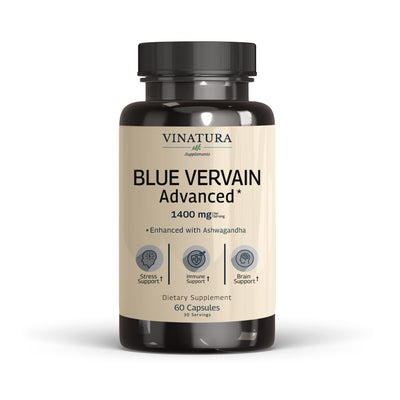
Does Rhodiola Lower Cortisol?
Numerous studies have demonstrated that Rhodiola may lower cortisol levels. Elevated cortisol levels can increase feelings of anxiety, depression, and stress, impacting our overall health. Rhodiola has been used as a natural solution to reduce stress and promote overall well-being. This article aims to answer the question: "Does Rhodiola reduce cortisol?" and explore its mechanisms of action and benefits concerning cortisol.
Before exploring further, please read the disclaimer located at the end of this webpage.
Key Takeaways
- Multiple studies suggest that Rhodiola can lower cortisol levels.
- Rhodiola may reduce cortisol by influencing the hypothalamic-pituitary-adrenal (HPA) axis, impacting the central nervous system, reducing inflammation, and acting as an antioxidant.
- Rhodiola provides numerous benefits, including stress and anxiety reduction, increased energy, cognitive function improvement, cardiovascular health enhancement, and sleep improvement.
- Other herbs besides Rhodiola that can be used include Ashwagandha, Holy Basil, Ginseng, and Chrysanthemum.
Does Rhodiola Lower Cortisol?

Rhodiola can help reduce the body's cortisol levels.
A study involving 60 participants aged 20 to 55 divided into two groups—one using Rhodiola and the other using a placebo—found that repeated use of Rhodiola Rosea extract may reduce stress by decreasing cortisol responses upon waking in individuals experiencing fatigue due to stress [1].
You may already know that cortisol is a hormone the adrenal glands produce in response to stress. Prolonged high cortisol levels can lead to various health issues such as anxiety, stress, depression, fatigue, and other health problems.
By lowering cortisol levels, Rhodiola promises to be a useful natural solution for mental health.
How Does Rhodiola Lower Cortisol?
Some potential mechanisms of Rhodiola in reducing cortisol include influencing the hypothalamic-pituitary-adrenal (HPA) axis, impacting the central nervous system, reducing inflammation, and acting as an antioxidant.
Rhodiola may influence the hypothalamic-pituitary-adrenal (HPA) axis. This mechanism was demonstrated in a study using hydroethanolic extract of Rhodiola rosea root (HRE) on stressed mice. Rhodiola extract may help reduce corticosterone levels in mice [2].
Rhodiola can also affect the central nervous system: To reduce your body's stress, Rhodiola may regulate neurotransmitters, stimulate the opioid system, and minimize the effects of stress on the brain and heart [3]. As your body experiences less stress, cortisol levels tend to decrease.
Moreover, chronic stress can lead to inflammation, increasing cortisol levels. Rhodiola has anti-inflammatory properties that help reduce inflammation and consequently lower cortisol [4].
Rhodiola rosea also exhibits strong antioxidant activity [5]. This property may help protect nerve cells from damage caused by free radicals and oxidative stress, thereby reducing cortisol.
Learn more: Rhodiola for Anxiety & Mood: Does Rhodiola Reduce Stress?
What are the Benefits of Rhodiola for Cortisol?
By reducing cortisol levels, Rhodiola may bring about several anticipated benefits.
Reducing stress and anxiety: High cortisol levels contribute to stress and anxiety, affecting mood negatively. By lowering cortisol, Rhodiola can alleviate stress symptoms, thereby enhancing overall mental well-being [3].
Enhancing energy levels: Rhodiola can boost energy, endurance, and exercise performance, promoting physical vigor and a cheerful disposition. This is also one of the benefits of Rhodiola for athletes. [6].
Improving cognitive function: Rhodiola enhances cognitive function, focus, and memory. A systematic review and meta-analysis of 36 preclinical studies involving 836 animals as of May 2018 showed significant improvements in learning and memory with Rhodiola [7]. This is particularly beneficial as high cortisol levels can negatively impact cognitive function.
Enhancing cardiovascular health: Elevated cortisol levels can increase blood pressure and heart rate. Rhodiola has been used to manage arrhythmias and improve cardiovascular health [8].
Improving sleep quality: Quality sleep contributes to a cheerful and healthy state of mind and can significantly reduce cortisol levels. Moreover, research has indicated that Rhodiola may help promote deeper sleep [3].
Read more: Does Rhodiola Make You Sleepy? Can You Take It Before Bed?
Other Herbal Supplements for Lowering Cortisol
Apart from Rhodiola, several other herbal remedies can help reduce cortisol levels, including:
- Ashwagandha: As an adaptogen, Ashwagandha reduces stress and anxiety significantly, improves sleep quality, reduces fatigue, lowers serum cortisol levels, and enhances overall health [9]. Moreover, you can use Ashwagandha and Rhodiola together, as both share adaptogenic properties. Combining these two herbs in the right dosage and formula can deliver remarkable benefits for your health.
- Holy Basil: This herb also aids in reducing stress, fatigue, and anxiety and improving sleep quality [10].
- Ginseng: Used to alleviate anxiety, depression, and stress-induced inflammatory disorders [11]. Ginseng is also employed in medicine to treat various ailments.
- Chrysanthemum: Improving anxiety symptoms through neurotransmitter modulation and endocrine pathways [12].
Frequently Asked Questions
Does Rhodiola Mess With Hormones?
Currently, no scientific evidence suggests that Rhodiola disrupts hormone balance in healthy individuals. However, Rhodiola may regulate the central nervous system, reducing cortisol secretion - a stress hormone - and improving mood.
What Does Rhodiola Do For Adrenals?
Rhodiola can influence the adrenal glands by reducing cortisol secretion, supporting their function, and protecting our adrenal glands.
Conclusion
Thus, "Does Rhodiola reduce cortisol?" has been answered. Rhodiola can help reduce cortisol levels and improve stress-coping abilities. Rhodiola can be a good choice if you are seeking a natural method to reduce stress and enhance overall health. However, alongside using Rhodiola, it's also important to maintain a balanced diet and lifestyle to ensure a healthy and scientific approach to living.
References
- [1] Olsson E, Bo von Schéele, Panossian A. A Randomised, Double-Blind, Placebo-Controlled, Parallel-Group Study of the Standardised Extract SHR-5 of the Roots of Rhodiola Roseain the Treatment of Subjects with Stress-Related Fatigue. Planta medica. 2008;75(02):105-112. doi:https://doi.org/10.1055/s-0028-1088346.
- [2] Anne‐Laure Dinel, Guinobert I, Lucas C, et al. Reduction of acute mild stress corticosterone response and changes in stress‐responsive gene expression in male Balb/c mice after repeated administration of a Rhodiola rosea L. root extract. Food science & nutrition. 2019;7(11):3827-3841. doi:https://doi.org/10.1002/fsn3.1249.
- [3] Emilija Ivanova Stojcheva, José Carlos Quintela. The Effectiveness of Rhodiola rosea L. Preparations in Alleviating Various Aspects of Life-Stress Symptoms and Stress-Induced Conditions—Encouraging Clinical Evidence. Molecules/Molecules online/Molecules annual. 2022;27(12):3902-3902. doi:https://doi.org/10.3390/molecules27123902.
- [4] Pu W, Zhang M, Bai R, et al. Anti-inflammatory effects of Rhodiola rosea L.: A review. Biomedicine & pharmacotherapy. 2020;121:109552-109552. doi:https://doi.org/10.1016/j.biopha.2019.109552.
- [5] Kosakowska O, Katarzyna Bączek, Przybył JL, et al. Antioxidant and Antibacterial Activity of Roseroot (Rhodiola rosea L.) Dry Extracts. Molecules/Molecules online/Molecules annual. 2018;23(7):1767-1767. doi:https://doi.org/10.3390/molecules23071767.
- [6] Tinsley GM, Jagim AR, Gregory, Garner D, Galpin AJ. Rhodiola Rosea as an Adaptogen to Enhance Exercise Performance: A Review of the Literature. British journal of nutrition. 2023;131(3):461-473. doi:https://doi.org/10.1017/s0007114523001988.
- [7] Ma G, Zheng Q, Xu M, et al. Rhodiola rosea L. Improves Learning and Memory Function: Preclinical Evidence and Possible Mechanisms. Frontiers in pharmacology. 2018;9. doi:https://doi.org/10.3389/fphar.2018.01415.
- [8] Chen Y, Tang M, Yuan S, et al. Rhodiola rosea: A Therapeutic Candidate on Cardiovascular Diseases. Oxidative medicine and cellular longevity. 2022;2022:1-14. doi:https://doi.org/10.1155/2022/1348795.
- [9] Office of Dietary Supplements - Ashwagandha: Is it helpful for stress, anxiety, or sleep? Nih.gov. Published 2021. Accessed June 24, 2024. https://ods.od.nih.gov/factsheets/Ashwagandha-HealthProfessional/.
- [10] Lopresti AL, Smith SJ, Metse AP, Drummond PD. A randomized, double-blind, placebo-controlled trial investigating the effects of an Ocimum tenuiflorum (Holy Basil) extract (HolixerTM) on stress, mood, and sleep in adults experiencing stress. Frontiers in nutrition. 2022;9. doi:https://doi.org/10.3389/fnut.2022.965130.
- [11] Lee S, Rhee DK. Effects of ginseng on stress-related depression, anxiety, and the hypothalamic–pituitary–adrenal axis. Journal of Ginseng Research/Journal of ginseng research. 2017;41(4):589-594. doi:https://doi.org/10.1016/j.jgr.2017.01.010.
- [12] Cui L, Zhang Q, Zhang Y, et al. Anxiolytic effects of Chrysanthemum morifolium Ramat Carbonisata-based carbon dots in mCPP-induced anxiety-like behavior in mice: a nature-inspired approach. Frontiers in molecular biosciences. 2023;10. doi:https://doi.org/10.3389/fmolb.2023.1222415.
Author

Product Disclaimer
Including an ingredient or study does not evaluate, endorse, or recommend any Vinatura product or any third-party product. Some ingredients discussed may not be used in any Vinatura product.
The content of the articles has not been evaluated by the Food and Drug Administration (FDA) and is not intended to promote or endorse any specific product. Any products sold on this website are not intended to diagnose, treat, cure, or prevent any disease.
Opinions and Endorsements
Any claims, statements, or opinions expressed in the articles are those of the author(s) and do not necessarily reflect the views or opinions of the manufacturers of the dietary supplement products. The products sold on this website are separate from the content of the articles and are not directly endorsed or associated with the information presented here.
Liability Disclaimer
The author(s) of the articles, website, and manufacturers of the dietary supplement products do not assume any liability for any potential consequences arising from the use of the information provided in the articles. Ingredient effects, dosages, and safety vary by individual, formulation, and context; some ingredients interact with medications or may be unsuitable during pregnancy or lactation. It is recommended that individuals consult with a qualified healthcare professional before making any dietary or lifestyle changes, including the use of dietary supplements.
Product Usage
Please refer to the product labels and packaging for specific usage instructions and guidelines for the dietary supplement products sold on this website.
Customer Support
For any concerns or questions regarding the dietary supplement products, please contact our customer support team, who will be more than happy to assist you.





Leave a Comment
Be the first to comment.
What do you think?